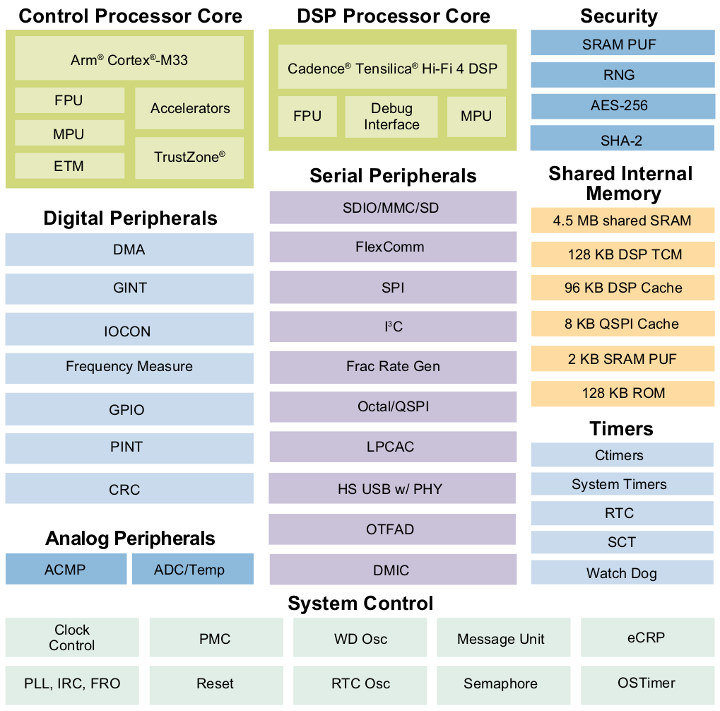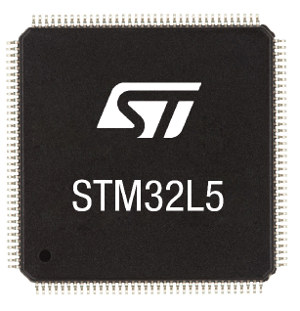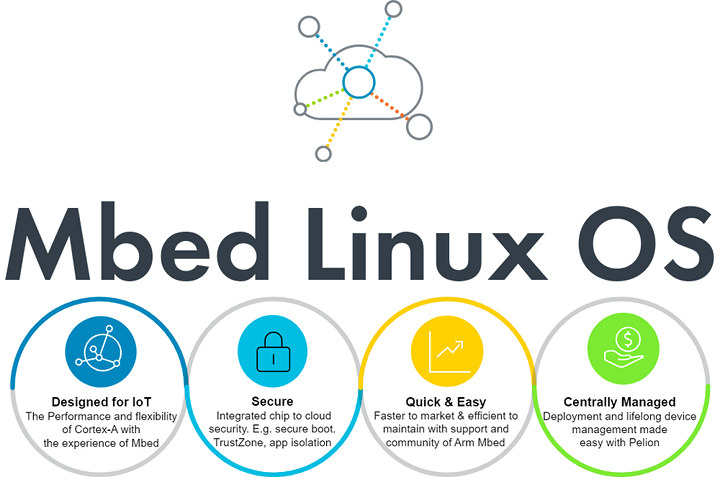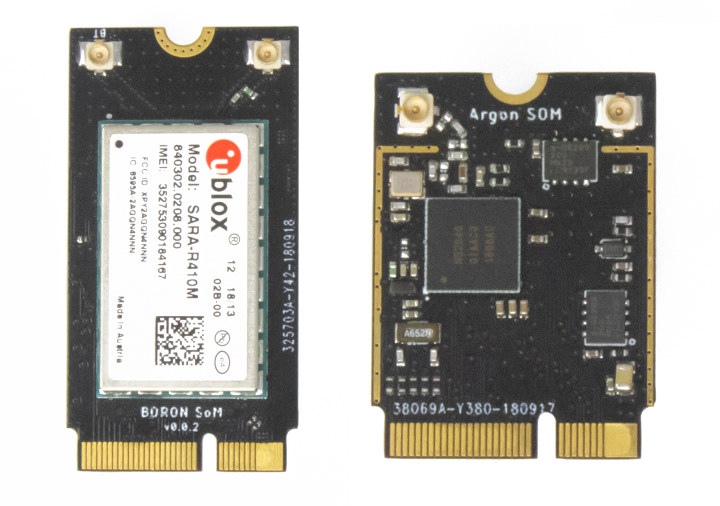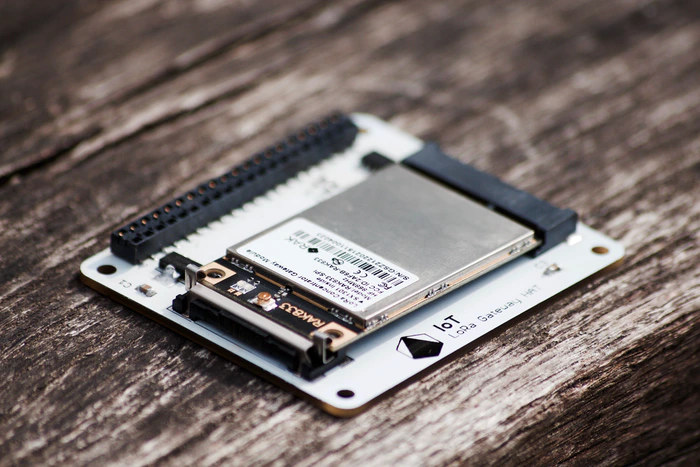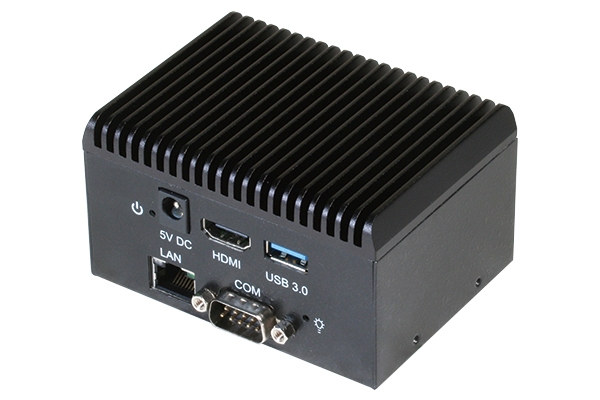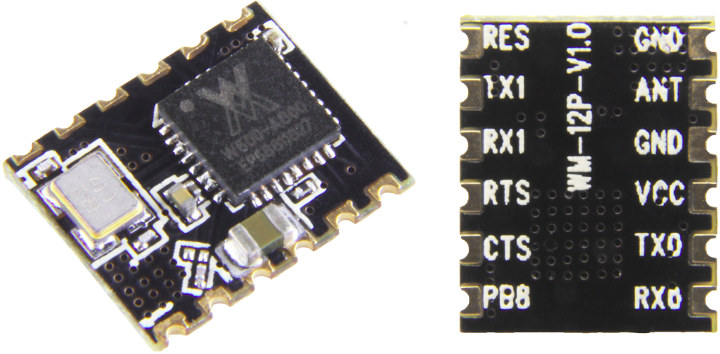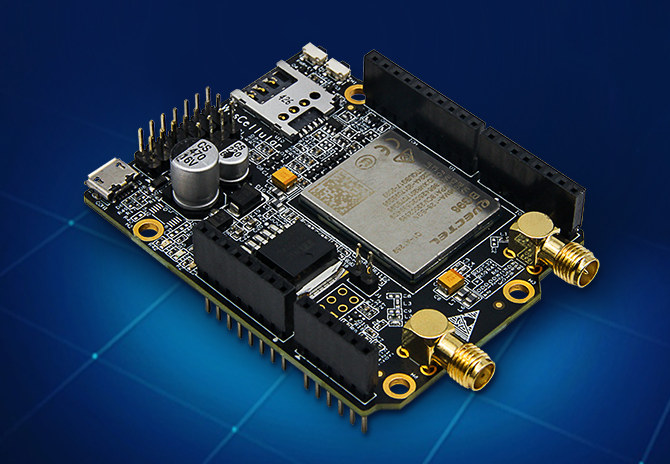A little over a year ago, NXP introduces their first crossover processor that blurs the line between real-time capabilities of microcontrollers and higher performance of application processors with NXP i.MX RT1050 processor equipped with a Cortex-M7 core clocked at up to 700 MHz. The company has now announced another model with lower power consumption. NXP i.MX RT600 series comes with a Cortex M33 core clocked at up to 300MHz, a Cadence Tensillica HiFi 4 audio DSP, and up to 4.5MB shared SRAM. Main features of NXP i.MX RT685 crossover processor: CPU Core – Arm Cortex-M33 up to 300 MHz DSP – Tensilica Hi-Fi 4 up to 600 MHz Memory Up to 4.5 MB on-chip RAM 128KB DSP TCM, 128 KB DSP Cache Storage 96KB ROM on-chip 2x SDIO with 1x supporting eMMC5.0 w/ HS400 1x Octal/Quad SPI up to 100MB/s Peripherals 2x DMA Engines with 35 channels each 1x USB […]
STMicro STM32L5 Cortex-M33 ARMv8-M MCU Family Targets Secure IoT Applications
STMicro STM32 microcontrollers have so far been based on Arm Cortex-M0/M0+, M3, M4, or M7 cores, although we’ve also seen a yet-to-be formally announced Cortex A7 variant shows up in Linux 4.17 with STM32MP157C. The company has very recently announced a new family, namely the STM32L5 series, powered by an Arm Cortex-M33 ARMv8-M 32-/64-bit TrustZone enabled core clocked at up to 110 MHz, and equipped with on-chip SMPS for easy low power efficiency, USB FS device, and USB type-C PD Controller. Two sub-families are part of the STM32L5 series: STM32L552 with 256 to 512 KB of Flash memory and from 48 to 144-pin packages. STM32L562 with 512 KB of Flash memory, and an additional encryption accelerator engine (AES, PKA, and OTFDEC). Besides the extra HW crypto block both share the same key specifications: MCU Core – Arm Cortex-M33 ARMv8-M core clocked at up to 110 MHz (+20% versus Cortex-M4) with […]
Arm Mbed Gets a Linux OS for Cortex-A Processors
Arm Mbed is known as a free, open source platform and operating system that makes it easier to design IoT products based on Cortex-M micro-controllers, but the company figured out it might be a good idea to make something similar for IoT devices based on Arm Cortex-A processor and that’s exactly what Mbed Linux OS is made for. Embedded & IoT devices normally need to be supported for many years, often optimized for cost and battery life, and make sure security patchsets are applying to your products. Companies often managed to do all those themselves but it’s not the most cost-effective solution, so instead Arm decided to leverage Linux and offer Mbed Linux OS optimized for IoT devices yo their customers. The solution comes with built-in security, device management (e.g. OTA firmware upgrades) via the Pelion IoT Platform, common development tools for faster time to market, and so on. Some […]
Particle Unveils Mesh SoMs and IoT Developer Tools
Earlier this year, Particle unveiled three IoT development boards based on nRF52840 Bluetooth 5/802.15.4 WiSoC and supporting Particle Mesh, which interestingly is not based on Bluetooth Mesh or even Bluetooth, and instead relies on Thread specification/OpenThread implementation, and the 802.15.4 radio of the chip with Bluetooth only used for the initial setup stage. Particle announced the shipping date (October 2018 or… this month) for their Mesh boards pre-ordered in February, as well as three new products in a recent blog post. One of the products is a family of system-on-modules compatible with Particle Mesh, while the other two are related IoT developer tools. Particle Mesh SOMs The Particle Mesh SOMs will have similar names and features as corresponding Particle mesh developers kits such as Boron (NB-IoT / eMTC + BLE + Mesh) and Argon (ESP32 WiFi, BLE + Mesh), but with an edge connector and designed as enterprise-grade, production-scale version […]
Pi Supply IoT LoRa Boards are made for Raspberry Pi & BBC Micro:bit Boards (Crowdfunding)
We’ve already covered plenty of LoRa boards or solutions designed for nodes or gateways such as TTGO T-Beam ESP32 + LoRa board, RAK Wireless RAK811 GPS Lora tracker board, MatchX Matchbox LoRa gateway, and many others,, but Pi Supply offers yet more options with LoRa node and gateway add-on boards designed to work with Raspberry Pi, Arduino, and BBC Micro:bit boards. Pi Supply LoRa Gateway HAT for Raspberry Pi The IoT LoRa Gateway HAT is based on RAK Wireless RAK833 mPCIe LoRa gateway concentrator module and connects to Raspberry Pi 3 B/B+ board via the 40-pin header. There are two hardware version using 868 MHz or 915 MHz frequencies, but as we’ve seen in previous reviews those are configurable for other frequencies such as AS923 or IN865. Pi Supply IoT LoRa Node pHAT for Raspberry Pi LoRa Node pHAT is designed for node specifically, and with a smaller form factor […]
AAEON UPC-GWS01 is Tiny IoT Gateway Powered by UP Core Board
AAEON’s UP Core is an affordable and compact Intel Atom x5-Z8350 based board that was launched last year on Kickstarter for 69 Euros and up. The company has now integrated the board into at least one of their product with UPC-GWS01, a tiny IoT gateway with WiFi and Bluetooth connectivity, as well as support for optional 3G/4G LTE connectivity via a mini PCIe slot. A carrier board for UP Core also added Ethernet and a DB9 serial port to the setup. AAEON UPC-GWS01 specifications: SoC – Intel Atom x5-Z8350 quad core Cherry Trail processor with Intel HD 400 graphics System Memory – 1GB/ 2GB/ 4GB onboard DDR3L-1600 Storage – 16GB/32GB/64GB eMMC Video and Audio Output – 1x HDMI port Connectivity Gigabit Ethernet via Realtek 8111G WIFI 802.11 b/g/n @ 2.4 GHz (WiFi 4) and Bluetooth 4.0 Optional 3G/4G cellular connectivity via mPCIe socket USB – 1x USB 3.0 host port […]
Air602 is another $2 WiFi IoT Module, Based on Winner Micro W600 Arm SoC
WiFi used to be fairly expensive to add to MCU projects with spending $30 to $40 just for a WiFi module pretty common just less than 5 years ago, but this all changed thanks to Tensilica based Espressif ESP8266 modules selling for $5 in 2014, and an active community gathering behind the WiSoC, and related modules and development board. ESP8266 modules are now available for under $2, and around two years ago it looked like we would have another option based on Arm Cortex-M3 with RTL8710 modules such as Pine64’s PADI IoT stamp also selling for about $2 in single quantities. However, most people did not really the benefit of switching to another platform based on Arm for this type of applications, and the products never really took off, many went away, and PADI IoT stamp appears to be one of the few survivors. Yet another $2 WiFi IoT module […]
WisCellular Certified Global LTE IoT Arduino Shield Enters Beta Testing
RAK Wireless introduced WisLTE Arduino shield last year based on Quectel BG96 module with support for NB-IoT (Cat NB1), eMTC (Cat M1), and 2G fallback as well as GPS location. WisLTE worked globally, but the company did not go through the certification process, at least not for the global market, meaning the shield could not be used in commercial applications. That’s why Rak Wireless has been working on WisCellular shield, also based on Quectel BG96, but this time with global certification. WisCellular specifications: Cellular Module – Quectel BG96 (based on Qualcomm MDM9206) Cellular Network 2G/GSM (GPRS/EPGRS) 4G/LTE-M (Cat M1) NB-IoT (Cat NB1) Global Bands EDGE/EGPRS: 850/900/1800/1900MHz LTE FDD: B1/B2/B3/B4/B5/B8/B12/B13/B18/B19/B20/B26/B28 LTE TDD: B39 (For Cat M1 Only) Data Rate Cat M1: Max. 300Kbps (DL), Max. 375Kbps (UL) Cat NB1: Max. 32Kbps (DL), Max. 70Kbps (UL) EDGE: Max. 296Kbps (DL), Max. 236.8Kbps (UL) GPRS: Max. 107Kbps (DL), Max. 85.6Kbps (UL) Voice – […]


